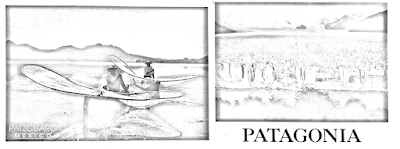Sept. 1, 2022 -- A new work of short fiction in mixed-media form—a story I've been whittling away at for years now—has happily reached print. "Sleepier Than Me," which pays tribute to Philip Seymour Hoffman in essaying the loss or near-death of people close to a ghostwriter named Benjamin, was published this summer by Western Humanities Review. An earlier version was included in my dissertation and won a creative writing award in 2020. Here is an excerpt from the story, which features archival photos and other illustrations:
In his 40s, his father began sending Benjamin postcards from distant places, some of which will come back to trouble the ghostwriter during the quarantines, on the eve of the same decade. Not the usual Mayan women at their looms, or the colored doors he knew from Antigua, but less familiar scenes. First there’s the glass-paneled stock exchange in Mexico City, where his correspondent has never seen so many Volkswagens, this whole army of miniature taxis for a population of 20 million. But that’s just a guess, writes his father, and if you think your aunt in Guatemala drives too fast, you should see these guys. Then there’s the fishermen balancing butterfly nets in Michoacán, where his father is talking to some nice people planting trees around a lake, to prevent soil erosion.
The last letter is from Buenos Aires. This is just before it happens, the ghostwriter imagines. The postcard shows a dark wall of ice spilling into another lake, a barren place where rodents from Europe have eaten away the trees. An impressive glacier in all its greatness, notes the caption.
Who knows, my son? Maybe I have some ancestors in Patagonia. The ghostwriter tries to picture the table where he’s writing. He tries reading these last words out loud, searching for small interruptions or other clues, but that is all it says.
The next person young Benjamin lost was more or less anonymous. The ghostwriter didn’t learn the real story until much later, in the obituaries, when the pandemic began picking off certain survivors. For a time, Benjamin suspected it was his father writing, trying to fill in the details. The letters mostly arrived on fluorescent paper, part of a church program that had congregants exchanging messages across zip codes on Sunday mornings. Envelopes and cubbyholes in the narthex, like a couple of agents in Berlin. Every word was capitalized, as if his correspondent had lost patience with various conventions of their lingua franca. At first, all the boy knew was that this guy had daughters in volleyball and basketball and a son who preferred Boy Scouts. Check. He worked for a timber company and didn’t much care for California. Check, check. Benjamin’s father preferred wandering the creek behind the farm to Sunday services, but remained a suspect. […]
In January, his correspondent is very busy. He’s putting together a deal involving equipment and a warehouse and an employee union. He’s negotiating with the union, and must soon agree on the wording of contracts and how things will work and also “the economics” of the deal. “Money,” he adds with a parenthetical smirk. Around this time, the letters arrive handwritten, as if his correspondent can’t get to a computer. But the capitalization continues, with much scribbling and underlining. Then in February, it’s all over. Benjamin meets his correspondent over spaghetti in the church basement. He looks quite bald and excited and also a bit frail. Nothing like his bearded father, who in those days might have been mistaken for a Cuban revolutionary. Even now, the correspondent reminds the ghostwriter of a TV anchor Benjamin doesn’t yet know. His name is Samuel. Just call me Sam Donaldson, says the half-grinning man.
The next day, or what seemed like the next day, someone who signs her name as Mrs. Anderson writes to say that Sam said to say he’s really sorry. About something called chemotherapy. About the Lord calling him home.
WHR 75.2 arrived in the mail just the other day here in Portland, with a preview available at the journal's website. My thanks to the other contributors and our editors for their work on this issue.














